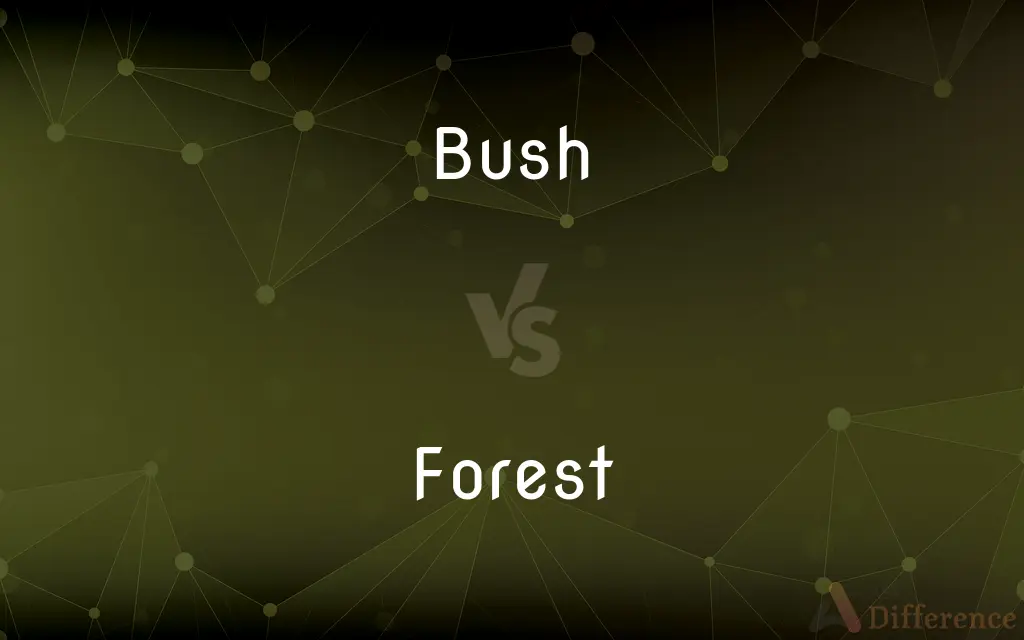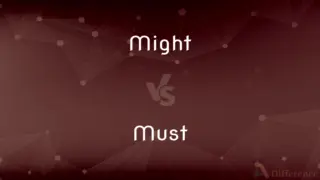Bush vs. Forest — What's the Difference?
By Tayyaba Rehman — Updated on November 1, 2023
Bush is a small, dense collection of shrubs; Forest is a large area covered with trees and underbrush.

Difference Between Bush and Forest
Table of Contents
ADVERTISEMENT
Key Differences
Bush often refers to a small, dense collection of shrubs. These are typically smaller plants that grow close to the ground and can form thickets. Forest, on the other hand, refers to a large expanse of land covered primarily with trees. This vastness often encompasses a variety of ecosystems and supports a diverse range of wildlife.
Bush can be seen in various settings, such as gardens, roadsides, or as part of the natural landscape. It's commonly found in arid regions or places with limited rainfall. Forest tends to cover vast areas and can span across countries or even continents. They play a crucial role in the planet's oxygen production.
Bush usually doesn't have the same canopy structure that forests do. While bushes might offer shelter to smaller animals and birds, they don't typically have layers like the forest floor, understory, canopy, and emergent layer. Forest ecosystems are structured and have distinct layers that provide habitat to a myriad of species.
In terms of conservation, both bush and forest are essential. Bushes can prevent soil erosion and provide habitat in smaller or fragmented landscapes. Forests, with their larger size, are vital for carbon sequestration, regulating climate, and serving as a habitat for many species.
Bush fires, often seen in drier regions, can be fast-spreading due to the compact nature of shrubs. Forest fires, on the other hand, can be incredibly destructive, affecting vast areas and having long-term impacts on the environment.
ADVERTISEMENT
Comparison Chart
Size
Smaller collection of shrubs
Large expanse of land with trees
Ecosystem Complexity
Less complex, fewer layers
Complex with multiple layers
Typical Location
Gardens, roadsides, arid regions
Large landscapes, often spanning regions
Conservation Value
Prevents soil erosion, supports small fauna
Carbon sequestration, regulates climate
Fire Behavior
Fast-spreading due to compact nature
Can be vast and highly destructive
Compare with Definitions
Bush
A sleeve that protects an electric cable where it passes through a panel.
Forest
Forest can represent a defined area, preserved for hunting or conservation.
The king loved hunting in the royal forest.
Bush
Bush refers to uncultivated land in certain countries.
He spent weeks exploring the Australian bush.
Forest
Forest is a vast area covered primarily with trees.
The forest echoed with the calls of wild animals.
Bush
Bush signifies a circuit or tour.
The band went on a bush circuit performing in small towns.
Forest
A forest is an area of land dominated by trees. Hundreds of definitions of forest are used throughout the world, incorporating factors such as tree density, tree height, land use, legal standing and ecological function.
Bush
Bush might refer to a metal sleeve or lining for a bearing.
The mechanic replaced the worn-out bush in the engine.
Forest
A large area covered chiefly with trees and undergrowth
A pine forest
A large tract of forest
Bush
A shrub or clump of shrubs with stems of moderate length
A rose bush
Forest
A large number or dense mass of vertical or tangled objects
A forest of high-rise apartments
Bush
(especially in Australia and Africa) wild or uncultivated country
They have to spend a night camping in the bush
Forest
Cover (land) with forest; plant with trees
A forested hillside
Bush
A luxuriant growth of thick hair or fur
A childish face with a bush of bright hair
Forest
A growth of trees and other plants covering a large area.
Bush
A metal lining for a round hole, especially one in which an axle revolves.
Forest
A large number of objects bearing a similarity to such a growth, especially a dense collection of tall objects
A forest of skyscrapers.
Bush
Spread out into a thick clump
Her hair bushed out like a halo
Forest
A defined area of land formerly set aside in England as a royal hunting ground.
Bush
A low shrub with many branches.
Forest
To plant trees on or cover with trees.
Bush
A thick growth of shrubs; a thicket.
Forest
A dense uncultivated tract of trees and undergrowth, larger than woods.
Bush
Land covered with dense vegetation or undergrowth.
Forest
Any dense collection or amount.
A forest of criticism
Bush
Land remote from settlement
The Australian bush.
Forest
(historical) A defined area of land set aside in England as royal hunting ground or for other privileged use; all such areas.
Bush
A shaggy mass, as of hair.
Forest
(graph theory) A graph with no cycles; i.e., a graph made up of trees.
Bush
Vulgar Slang A growth of pubic hair.
Forest
A group of domains that are managed as a unit.
Bush
A fox's tail.
Forest
The colour forest green.
Bush
(Archaic) A clump of ivy hung outside a tavern to indicate the availability of wine inside.
Forest
(transitive) To cover an area with trees.
Bush
(Obsolete) A tavern.
Forest
An extensive wood; a large tract of land covered with trees; in the United States, a wood of native growth, or a tract of woodland which has never been cultivated.
Bush
To grow or branch out like a bush.
Forest
A large extent or precinct of country, generally waste and woody, belonging to the sovereign, set apart for the keeping of game for his use, not inclosed, but distinguished by certain limits, and protected by certain laws, courts, and officers of its own.
Bush
To extend in a bushy growth.
Forest
Of or pertaining to a forest; sylvan.
Bush
To decorate, protect, or support with bushes.
Forest
To cover with trees or wood.
Bush
To furnish or line with a bushing.
Forest
The trees and other plants in a large densely wooded area
Bush
(Slang) Bush-league; second-rate
"Reviewers here have tended to see in him a kind of bush D.H. Lawrence" (Saturday Review).
Forest
Land that is covered with trees and shrubs
Bush
(horticulture) A woody plant distinguished from a tree by its multiple stems and lower height, being usually less than six metres tall; a horticultural rather than strictly botanical category.
Forest
Establish a forest on previously unforested land;
Afforest the mountains
Bush
A shrub cut off, or a shrublike branch of a tree.
Bushes to support pea vines
Forest
Forest signifies a dense growth of trees and plants.
The plane flew over the dense forest canopy.
Bush
(historical) A shrub or branch, properly, a branch of ivy (sacred to Bacchus), hung out at vintners' doors, or as a tavern sign; hence, a tavern sign, and symbolically, the tavern itself.
Forest
Forest may be a domain or sphere.
She navigated the forest of regulations with ease.
Bush
A person's pubic hair, especially a woman's.
Forest
Forest sometimes refers to a large number of objects in a particular arrangement.
The artist created a forest of sculptures in the park.
Bush
(hunting) The tail, or brush, of a fox.
Bush
(archaic) A tavern or wine merchant.
Bush
(often with "the") Tracts of land covered in natural vegetation that are largely undeveloped and uncultivated.
Bush
(Australia) The countryside area of Australia that is less arid and less remote than the outback; loosely, areas of natural flora even within conurbations.
Bush
(New Zealand) An area of New Zealand covered in forest, especially native forest.
Bush
(Canadian) The wild forested areas of Canada; upcountry.
Bush
(Canadian) A woodlot or bluff on a farm.
Bush
(baseball) Amateurish behavior, short for "bush league behavior"
Bush
A thick washer or hollow cylinder of metal.
Bush
A mechanical attachment, usually a metallic socket with a screw thread, such as the mechanism by which a camera is attached to a tripod stand.
Bush
A piece of copper, screwed into a gun, through which the venthole is bored.
Bush
(intransitive) To branch thickly in the manner of a bush.
Bush
To set bushes for; to support with bushes.
To bush peas
Bush
To use a bush harrow on (land), for covering seeds sown; to harrow with a bush.
To bush a piece of land; to bush seeds into the ground
Bush
To become bushy (often used with up).
I can tell when my cat is upset because he'll bush up his tail.
Bush
(transitive) To furnish with a bush or lining; to line.
To bush a pivot hole
Bush
(Australia) Towards the direction of the outback.
On hatching, the chicks scramble to the surface and head bush on their own.
Bush
(colloquial) Not skilled; not professional; not major league.
They're supposed to be a major league team, but so far they've been bush.
Bush
A thicket, or place abounding in trees or shrubs; a wild forest.
Bush
A shrub; esp., a shrub with branches rising from or near the root; a thick shrub or a cluster of shrubs.
To bind a bush of thorns among sweet-smelling flowers.
Bush
A shrub cut off, or a shrublike branch of a tree; as, bushes to support pea vines.
Bush
A shrub or branch, properly, a branch of ivy (as sacred to Bacchus), hung out at vintners' doors, or as a tavern sign; hence, a tavern sign, and symbolically, the tavern itself.
If it be true that good wine needs no bush, 't is true that a good play needs no epilogue.
Bush
The tail, or brush, of a fox.
Bush
A lining for a hole to make it smaller; a thimble or ring of metal or wood inserted in a plate or other part of machinery to receive the wear of a pivot or arbor.
Bush
A piece of copper, screwed into a gun, through which the venthole is bored.
Bush
To branch thickly in the manner of a bush.
Bush
To set bushes for; to support with bushes; as, to bush peas.
Bush
To use a bush harrow on (land), for covering seeds sown; to harrow with a bush; as, to bush a piece of land; to bush seeds into the ground.
Bush
To furnish with a bush, or lining; as, to bush a pivot hole.
Bush
A low woody perennial plant usually having several major branches
Bush
A large wilderness area
Bush
Dense vegetation consisting of stunted trees or bushes
Bush
43rd President of the United States; son of George Herbert Walker Bush (born in 1946)
Bush
United States electrical engineer who designed an early analogue computer and who led the scientific program of the United States during World War II (1890-1974)
Bush
Vice President under Reagan and 41st President of the United States (born in 1924)
Bush
Hair growing in the pubic area
Bush
Provide with a bushing
Bush
Not of the highest quality or sophistication
Bush
Bush is a dense group of low-growing plants.
The rabbit hid in the bush to escape the fox.
Bush
Bush can mean a rural, undeveloped area.
She grew up in the bush, far from the city.
Common Curiosities
Is the word 'bush' specific to certain regions?
While 'bush' is universally understood, it's often associated with uncultivated land in countries like Australia.
Are bushes found in forests?
Yes, bushes can be part of the understory in a forest.
Can a forest exist without bushes?
Yes, forests can exist without bushes, especially in areas with tall, dense tree canopies.
What defines a forest?
A forest is a large area covered primarily with trees and underbrush.
Do forests have different layers?
Yes, forests can have layers like the forest floor, understory, canopy, and emergent layer.
What is a bush?
Bush is a dense group of low-growing plants, typically smaller than trees.
Is a bush the same as a shrub?
While the terms are often used interchangeably, a bush typically refers to a group of shrubs or a dense, low-growing plant.
How does the biodiversity differ between a bush and a forest?
Forests generally have greater biodiversity due to their size and layered structure, while bushes support smaller fauna.
How do humans impact forests?
Human activities like deforestation, logging, and urbanization can have significant impacts on forests.
Can bushes prevent soil erosion?
Yes, bushes, with their dense root systems, can help prevent soil erosion.
What role do forests play in climate regulation?
Forests sequester carbon, produce oxygen, and regulate global temperatures.
Is 'bush' ever used in an industrial context?
Yes, in mechanics, a 'bush' can refer to a metal sleeve or lining for a bearing.
What's the difference in fire behavior between bush and forest?
Bush fires can spread rapidly due to dense shrubs, while forest fires can be vast and highly destructive.
Are forests always larger than bushes?
Typically, yes. Forests cover large expanses, while bushes are smaller collections of shrubs.
Can bushes be cultivated?
Yes, many bushes are cultivated for landscaping, gardening, or agricultural purposes.
Share Your Discovery

Previous Comparison
Might vs. Must
Next Comparison
Glad vs. HappyAuthor Spotlight
Written by
Tayyaba RehmanTayyaba Rehman is a distinguished writer, currently serving as a primary contributor to askdifference.com. As a researcher in semantics and etymology, Tayyaba's passion for the complexity of languages and their distinctions has found a perfect home on the platform. Tayyaba delves into the intricacies of language, distinguishing between commonly confused words and phrases, thereby providing clarity for readers worldwide.















































